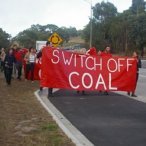English · Español

21 November 2011 | Interviews | Resisting neoliberalism | Extractive industries | Climate Justice and Energy | COP 17
The Naked Truth
Interview with David Hallowes, from groundWork-Friends of the Earth South Africa
Download: MP3 (10.6 Mb)
“We believe that the parties to the conference, in other words the national governments who are going there, have been much more interested to defend their interest in capital than they have been to address the problem. (...)What we think needs to happen is that there needs to be a different logic. Governments need to start going to the COP on the logic that we actually have to address the climate issue and we think that is not going to happen unless people force them to”.
This is what environmentalist David Hallowes, member of groundWork – Friends of the Earth South Africa, said in an interview with Real World Radio about the UN climate negotiation process and the change needed in his opinion.
The UN COP 17 on Climate Change will start in a week, in Durban, South Africa. “At the moment the interests that governments are representing in the COP are not the interests of people, we think that they’re the interests of capital and that is not going to produce an agreement that is credible”, highlighted Hallowes.
This is why the challenge for social movements fighting for climate justice is to strengthen the resistance and mobilizations at the next COP, to make the voices of the organized civil society be heard. According to Hallowes, “the real thing is how we engage people (...) and how we effectively get a very substantial mobilization of people".
There are at least two African caravans of social movements and organizations travelling through the continent to arrive to Durban before the COP, supported by the Pan-African Climate Justice Network. “We are looking forward to a good mobilization of people”, said Hallowes.
Power generation in South Africa, and the country’s high dependence on coal is one of the most concerning issues according to groundWork.
In fact, it is one of the main themes of the book launched in September by the organization, titled “Toxic Futures: South Africa in the Crises of Energy, Environment and Capital”, written by Hallowes himself.
The book “is concerned with the direction of industrial policy” of the country, said the activist. “The book is not so much about nature conservation, it’s much more about industrial pollution (...) it’s looking at the formation of South Africa’s industry, which is very energy intensive”, he added. GroundWork’s new book also makes reference to the country in an international context of capital crises, and it includes a chapter on climate change.
The South African organization member of Friends of the Earth is organizing the “Dirty Energy Week” in Durban, from November 22-25, before the COP, to discuss several issues and concerns related to energy and its impacts on climate. Nearly 100 per cent of South African energy is generated from coal, and carbon dioxide is the main greenhouse gas. Some processes are of special concern for groundWork, for instance, the dirty mechanisms used by South African petro-chemistry company, Sasol, to produce liquid fuels, the new polluting plants and the role of state-energy company Eskom, or the plans of the country to build nuclear plants. Several national and foreign social groups will come to Durban for this special "week".
For groundWork, the path to follow is that of “energy sovereignty”.
“What groundWork is looking to explore is the idea of energy sovereignty. (...) First of all the democratic control of energy”, said Hallowes, highlighting that Eskom is a state company but it behaves as a “private monopoly”. “What we would like to see is a real democratic control over the production of energy whether at national or local level”, using renewable sources, he said, adding“we want to develop these ideas with communities”.
Photo: www.foei.org







